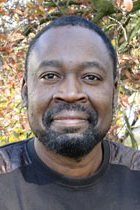Statemania: When the American dream came to Africa

Rahmane Idrissa has written an essay for the inaugural issue of the new magazine Equator.
In 'Statemania', Idrissa reflects on the fascination that in the 1990s swept across parts of Africa - Niger in his personal experience - with the United States and its model of democracy, capitalism, and global dominance.
The author contrasts this period with earlier decades of "Sovietmania", when revolutionary socialism and pan-African ideals guided political thought. After the collapse of the Soviet Union, however, American influence became visible in education, culture, and migration dreams: the country was seen as the centre of global opportunity. Nevertheless, Idrissa frames this enthusiasm as both revealing and misguided, reflecting more a fascination with strength and prosperity, than a commitment with freedom and democratic ideas.
Read the full article here.
Author(s) / editor(s)
About the author(s) / editor(s)
Rahmane Idrissa is a political scientist fast embracing history. His doctorate in political science, with a concentration on democratisation and political Islam in Africa, was obtained at the University of Florida. Idrissa’s research expertise ranges from issues of states, institutions and democratisation in Africa to Salafi radicalism in the Sahel and current projects on the history of state formation in Africa, with a focus both on the modern (Niger) and premodern eras (Songhay).
Before joining the ASCL, Idrissa has founded and run EPGA, a think tank in political economy in Niger, training students and coordinating projects based on methodologies of political economy analysis that focused on migration, youth employment and demography. In recent years, EPGA has worked in partnership with Clingendael on projects on migration, security issues and traditional governance in the Sahel borderlands.
Idrissa is also associated with the Niamey based social science laboratory LASDEL and is on the editorial board of the African Studies Quarterly, at the University of Florida.

